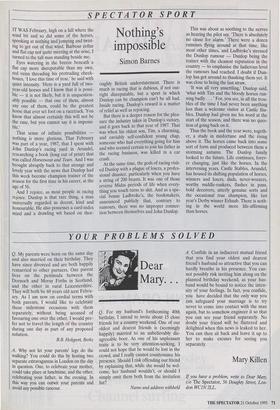SPECTATOR SPORT
Nothing's impossible
Simon Barnes
IT WAS February, high on a hill where the wind bit and so did some of the horses, spooking at nothing and jumping and twist- ing to get out of that wind. Barbour collar and flat cap not quite meeting at the nose, I turned to the tall man standing beside me.
Eyes watering in the breeze beneath a flat cap more disreputable than my own, red veins threading his protruding cheek- bones, 'I love this time of year,' he said with quiet intensity. 'Here is a yard full of two- year-old horses and I know that it is possi- ble — it is not likely, but it is unquestion- ably possible — that one of them, almost any one of them, could be the greatest horse that ever set foot on a racetrack. You know that almost certainly this will not be the case, but you cannot say it is impossi- ble.'
That sense of infinite possibilities nothing is more glorious. That February was part of a year, 1987, that I spent with John Dunlop's racing yard in Arundel, researching a book (long out of print) that was called Horsesweat and Tears. And I was brought abruptly back to that strange and lovely year with the news that Dunlop had this week become champion trainer of the season for the first time in his career, at the age of 56.
And I rejoice, as most people in racing rejoice. Dunlop is that rare thing, a man universally regarded as decent, kind and honourable. He also possesses a card-index mind and a drawling wit based on thor- oughly British understatement. There is much in racing that is dubious, if not out- right disreputable, but a sport in which Dunlop can be champion can't be all bad. Inside racing, Dunlop's reward is a matter of relief as well as rejoicing.
But there is a deeper reason for the plea- sure the industry takes in Dunlop's victory, and it goes back to that year of 1987. That was when his oldest son, Tim, a charming, and enviably self-confident young chap, someone who had everything going for him and who seemed certain to join his father in the racing business, was killed in a car crash.
At the same time, the gods of racing visit- ed Dunlop with a plague of losers, a profes- sional disaster, particularly when you have a string of 200 beasts. It was one of those reverse Midas periods of life when every- thing you touch turns to shit. And as a spe- cial bonus Ladbrokes, the bookmakers, announced publicly that, contrary to rumours, there was no improper connec- tion between themselves and John Dunlop. This was about as soothing to the nerves as hearing the pilot say, 'There is absolutely no cause for alarm.' There were a dozen rumours flying around at that time, like most other times, and Ladbroke's stressed the Dunlop rumour — Dunlop being the trainer with the cleanest reputation in the country — to emphasise the ludicrous level the rumours had reached. I doubt if Dun- lop has got around to thanking them yet. It was close to being the last straw.
`It was all very unsettling,' Dunlop said, `what with Tim and the bloody horses run- ning badly . . . ' For, you see, in all the trou- bles of the time I had never been anything less than a welcome visitor at Castle Sta- bles. Dunlop had given me his word at the start of the season, and there was no ques- tion of going back on it.
Thus the book and the year were, togeth- er, a study in misfortune and the rising above it. The horses came back into some sort of form and produced between them a storming autumn. The Dunlop family looked to the future. Life continues, forev- er changing, just like the horses. In the intervening years, Castle Stables, Arundel, has housed its shifting population of horses, winners and losers, duds, never-wozzers, worthy middle-rankers, flashes in pans, bold deceivers, utterly genuine sorts and the occasional true champion, like last year's Derby winner Erhaab. There is noth- ing in the world more life-affirming than horses.










































































 Previous page
Previous page